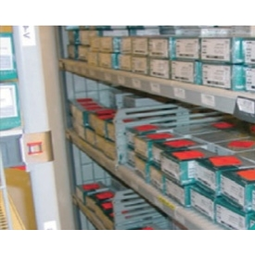Case Studies.
Our Case Study database tracks 18,927 case studies in the global enterprise technology ecosystem.
Filters allow you to explore case studies quickly and efficiently.
-
(2)
- (2)
-
(2)
- (2)
-
(2)
- (2)
-
(1)
- (1)
- (2)
- (2)
- (2)
- (2)
Selected Filters
2 case studies
|
Hospital Inventory Management
Impinj
The hospital supply chain team is responsible for ensuring that the right medical supplies are readily available to clinicians when and where needed, and to do so in the most efficient manner possible. However, many of the systems and processes in use at the cancer center for supply chain management were not best suited to support these goals. Barcoding technology, a commonly used method for inventory management of medical supplies, is labor intensive, time consuming, does not provide real-time visibility into inventory levels and can be prone to error. Consequently, the lack of accurate and real-time visibility into inventory levels across multiple supply rooms in multiple hospital facilities creates additional inefficiency in the system causing over-ordering, hoarding, and wasted supplies. Other sources of waste and cost were also identified as candidates for improvement. Existing systems and processes did not provide adequate security for high-cost inventory within the hospital, which was another driver of cost. A lack of visibility into expiration dates for supplies resulted in supplies being wasted due to past expiry dates. Storage of supplies was also a key consideration given the location of the cancer center’s facilities in a dense urban setting, where space is always at a premium. In order to address the challenges outlined above, the hospital sought a solution that would provide real-time inventory information with high levels of accuracy, reduce the level of manual effort required and enable data driven decision making to ensure that the right supplies were readily available to clinicians in the right location at the right time.
|
|
Hospital Supply Management
Impinj
UT Medical Center and DeRoyal began working together in 2014 initially to develop a new preference card system for use in their operating rooms. What they found was a need to not just optimize physician preference cards, but also a need to analyze supply usage, stocking levels, returns, locations and quantities. They needed a solution that would help make acuity-based decisions and accurately document usage. Improving patient safety during procedures was also a priority. The medical center’s workflow studies found surgical staff leaving the OR for an average of 10.75 minutes per case to fetch supplies needed for OR procedures because they were not readily available in the OR. Such repeated door openings can increase the risk of surgical site infection and contribute to surgical mistakes. UT Medical Center wanted to limit the number of supply-related door openings by having needed supplies readily available, and thereby reduce the risk of surgical site infections. DeRoyal, a medical device manufacturer committed to improving both the clinical quality and economic health of its customers, worked with UT Medical Center to create a solution that would meet the organization’s needs. The solution, an intelligent trashcan called the DeRoyal Continuum® Safe, leverages the Impinj platform to automatically capture data about supplies consumed during surgical procedures.
|






